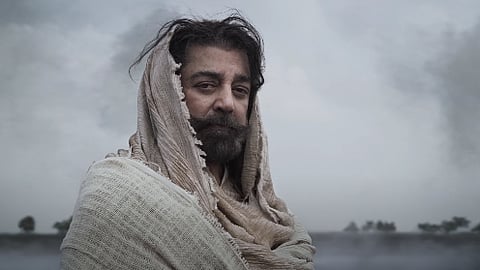

Follow TNM’s WhatsApp channel for news updates and story links.
The Supreme Court, on Thursday, June 19, closed the public interest litigation challenging the unofficial ban on Kamal Haasan’s film Thug Life in Karnataka, after the state government assured full protection for its release and committed to act promptly against any attempts to obstruct screenings. The top court recorded the Karnataka government's commitment to provide "protection and security" for the release of the film.
A bench comprising Justices Ujjal Bhuyan and Manmohan took note of the Karnataka Home Department's affidavit, which stated that it has not imposed any restriction on the film’s release. The affidavit assured that the state government will ensure the safety of all stakeholders involved, including cast, producers, exhibitors, and audiences, if the film is screened in the state.
The court underscored, “Rule of law demands that any film which has a CBFC [Central Board of Film Certification] certificate must be released, and the state government has to ensure its screening. It can't be that, at the threat of burning down the cinemas, the film can't be released.” Justice Bhuyan added, “We cannot allow mobs and vigilante groups to take over the streets. The rule of law must prevail.”
The film has faced an “extra-judicial ban” in Karnataka following Kamal’s statement that “Kannada is born out of Tamil,” which triggered strong backlash and threats from fringe groups. This prompted Bengaluru resident M Mahesh Reddy to file a public interest litigation (PIL) before the Supreme Court seeking directions to allow the film’s release and police protection.
The bench also appreciated the Karnataka government’s counsel DL Chidanand’s assurance that the state “is duty bound and will give protection and security for such release and for the people connected therewith.” The Court observed, “Hurt sentiments cannot be a ground for the public to take the law into their hands... In India, where language and caste continue to be emotive issues, there will never be an end to the hurt sentiment phenomenon. But for that, right to free speech cannot be jeopardised or the rule of law cannot be compromised.”
During the hearing, the court also addressed the Karnataka Film Chamber of Commerce’s role. While the Chamber had earlier announced a ban under pressure from protests, its counsel denied issuing threats, stating they merely communicated widespread opposition to the producer.
Justice Bhuyan sharply questioned their failure to report alleged mob pressure to police, stating, “You succumbed to mob pressure. Did you go to the police? No. That means you have no complaints against them. You are hiding behind them.”
The Court also addressed the Kannada Sahitya Parishad’s concerns about language sentiments. Senior Advocate Sanjay Nuli, appearing for the Parishad, said Haasan should have exercised restraint. However, the bench countered, “If you are hurt by the statements, then file a defamation case. You cannot take the law into your own hands.” The Court insisted the film’s release cannot be obstructed on such grounds.
Senior advocate Satish Parasaran, representing the producer Raj Kamal Films International, stated the non-release in Karnataka had caused nearly Rs 30 crore in losses but expressed satisfaction with the state’s assurances and chose not to pursue the petition further.
The Court recorded the Karnataka government's undertaking that it will take prompt legal action against anyone attempting to prevent the film's release through coercion or violence. It refused to lay down fresh guidelines or impose costs, stating that the state’s affidavit and assurances warranted closure of the proceedings.
The Supreme Court’s firm stance emphasized the primacy of the rule of law and fundamental rights in artistic expression, with Justice Manmohan remarking, “This is concerning the rule of law and fundamental rights. Therefore, this Court is intervening. It is not just about a film.”
The matter arose after the film’s release worldwide on June 5, 2025, except in Karnataka, where protests had effectively stalled its screening. The Court’s intervention now paves the way for the film to be screened in the state with state protection assured.
(With IANS inputs)